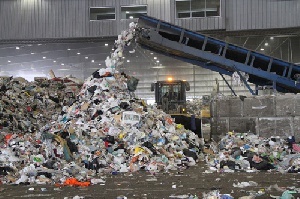A Ghanaian – USA based mining and energy engineering professor has advised the government to consider waste-to-energy (WTE) option to reduce the electricity costs in the country by approximately 50%. He stressed that the waste produced in the nation and dumped in landfills, on the streets and into incinerators can be used to help bridge the energy gap in Ghana. According to him, reliable and affordable energy from multi-source generation systems is key to realizing maximum economic output from businesses and the comfort of ordinary Ghanaians. WTE conversion is an important component for achieving this noble goal in Ghana.
WTE centers can be built in selected locations to serve different towns, hospitals, schools and industry units. Professor Frimpong made this known to Ghanaians abroad when he was interviewed by Solomon Owusu on Amenado Radio in Denver, Colorado, USA, during the famous “dwen Ghana ho” radio program on Sunday, May 06, 2018. The interview lasted for over two hours and people called in with questions from different countries around the world. Prof. Frimpong patiently and diligently answered all the questions pertaining to WTE generation. The listeners commended him for his deep understanding of the sanitation problems faced by the nation and his willingness to help.
Educating the listeners on the show, he referenced The World Bank Group’s worldwide classification of solid waste products into 64% organic and 36% inorganic matter for developing economies like Ghana. In his view, science, technology and innovation have demonstrated the feasibility of energy generation from organic waste by pelletizing and gasifying the waste product as fuel source to power regular generators. During the discussions, Prof. Frimpong noted that Sweden generates 20% electrical energy for heating from WTE conversion. Other countries that have been successful in developing WTE technologies include Denmark, Norway, Germany UAE, UK and USA.
When asked if he had plans to help Ghana with the technology, he responded that the indiscriminate disposal of waste, which causes uncontrolled sanitation problems, prompted him to collaborate with his USA and Canada colleagues who have immense experience and technical know-how in WTE conversion for over 20 years, to put a proposal together to harvest energy from waste, which also has an added advantage of cleaning Ghana’s environment. The implementation of the proposal will begin with a pilot project to produce about 32 kilowatts of electricity that can power a hospital, a school or an industry unit for about 12 to 18 hours a day. Upon successful implementation at the pilot stage, bigger units can be developed to power larger segments of communities for longer hours.
The implementation of this technology on a larger scale, backed by battery storage units can lead to significant reductions in electricity costs in the country. Furthermore, the demand for waste to feed the plants in the various locations within the municipalities will end up creating jobs and solving the sanitation problems concurrently. This is because the plant operators may purchase waste to feed them. From his speech, the major challenge his team may encounter will be the bureaucratic process they may go through before the project approval.
Dr. Frimpong is a renowned professor of mining and energy engineering at Missouri University of Science and Technology, USA. He is an alumnus of both Opoku Ware School (OWASS) in Kumasi and the George Grant University of Mines and Technology (UMaT) in Tarkwa. He received his bachelor’s degree and a postgraduate diploma in mining engineering from UMaT. He pursued his masters and doctorate degrees in mining engineering at the University of Zambia and University of Alberta, Canada respectively.
Professor Frimpong is currently Chairman of the UMaT Alumni in the Diaspora and also the President of the AKATAKYIE USA (OWASS). Prof. has trained over 35 graduates with several of these graduates occupying academic and industry positions in universities and top mining companies around the world. Professor Frimpong has carried out research and academic initiatives in several countries, namely, Canada, USA, Brazil, Peru, Ecuador, Dominican Republic, Mongolia, Indonesia, China, Australia, Saudi Arabia, Botswana and Ghana.
He is currently a member of APLU Board on Natural Resources in USA; National Occupational Research Agenda of CDC-NIOSH in USA; National Minerals Research Partnership of APLU in USA; UNESCO Council on Emerging Energy Technologies; and College of Reviewers for the Canada Foundation for Innovation and Canada Research Chairs Program. He previously served as member of the Mine Safety and Health Research Advisory Committee (MSHRAC) of CDC–NIOSH appointed by US Human and Health Services Secretary and Japan’s Research Consortium on Global Warming.
He was a Co-Chair for the ASCE-UNESCO Monograph on Emerging Energy Technologies and Infrastructure. As part of his research effort, Professor Frimpong serves as the Editor-In-Chief of the Journal of Powder Metallurgy and Mining; Editor for Research and Reports on Metal and Mining; Chief Editor – Mining Engineering for INTECH Publications; Associate Editor, International Journal of Mining and Minerals Engineering; and Editorial Board Member, International Journal of Mining, Reclamation and Environment.
The global Ghanaian born genius has received various awards and recognitions. These prestigious awards include Daniel C. Jackling Award from SME, Englewood, CO (2017); Robert H. Quenon Endowed Chair, Missouri S&T (2004 – Date); Missouri S&T’s Chancellor’s Leadership Award (2010); Distinguished Lecturer Award by Canadian Petroleum Institute (1998 – 2004); Award of Distinction by World Mining Congress (1997); University of Alberta/CIDA PhD Scholar (1989 – 1992); Life Patron, UMaT, Ghana (2001 – Date); Grand Award for Best Paper by NW Mining Association (1989); and UNESCO Research Fellow (1986 – 1988).
As a staunch Christian and a leading expert in mining and energy engineering, he completed the interview with a closing remark by admonishing all Ghanaians across the globe to intercede for the nation through prayers so that God will help Ghana’s leaders with the strength, energy and foresight to properly manage the country’s mineral and energy resources.
Diaspora News of Friday, 11 May 2018
Source: Solomon Owusu
Ghana’s waste conversion to energy can reduce electricity costs by 50% - Prof. Frimpong.
Entertainment












